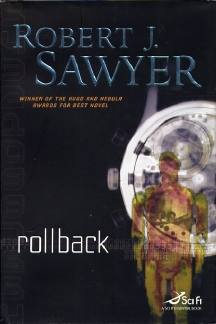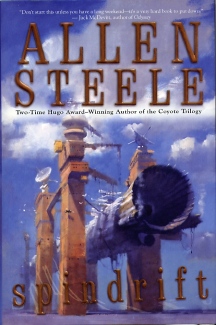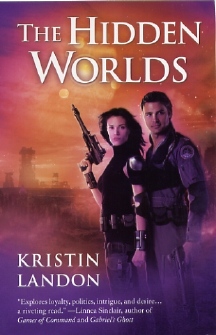|
|
|
|
This Just In...News
From The Agony Column
|
|
04-06-07: Robert J. Sawyer's 'Rollback' , Christopher Buckley's 'Boomsday'
|
Same Price, Different Age
|
|
Not
splurging on the cover, are we?
|
Science fiction writers of late have begun an advance attack on aging.
Peter F. Hamilton's 'Misspent
Youth' and John Scalzi's 'Old
Man's War'
both feature
de-aging technology as a major part of the plot. This isn’t just
eternal youth we're talking about either. It's not just stopping the
clock, it's
winding it back so that the aged can be young again. These books are
a testament towards our unease with the aged and elderly, a tribute to
our fear of our
own inevitable future.
But more than the future, they’re also, not surprisingly, a reflection
of the present. We live in a society where it is not possible to be too
young, and is all too easy to be too old, a world in which those elderly
who are
not wealthy are left helpless and discarded by a society embarrassed
by their very presence. We'd like to, er get rid of 'em to be precise,
were we not
them. Two very different authors take very different looks at this fear
of the future; Robert J. Sawyer's 'Rollback' (Tom Doherty
Associates / Tor Books
; April 3, 2007 ; $24.95) posits a very near future in which the technology
exists to "rollback" the aged to their blessed youth. Brought
to you by...well, you know. (No, just kidding.) And Christopher
Buckley's 'Boomsday'
(Twelve ; April 2, 2007 ; $24.99) offers us a delightful solution to
the so-called Social Security crisis. Give those retiring Boomers huge
tax breaks
if they promise to opt out of Social Security by killing themselves.
Break out the wrinkle cream, folks, and learn to lie about your age.
Convincingly.
Sawyer's 'Rollback' begins with a message from aliens, decoded by Dr.
Sarah Halifax -- a long damn time ago. Thirty-eight friggin' years ago
to be precise.
Now, at the tender age of 87 she finds her skills in demand again when
another message arrives. Alas, she's not quite up to the task. Enter
Cody McGavin,
a wealthy industrialist who offers to spring for her rollback procedure
so she can suss out the message and save the world, assuming she's inclined.
She's not however, unless her husband Don gets the procedure as well.
One
billion, two billion, it's all the same when you’re super rich,
right? So they both get the procedure but, here's the irony, it only
works for hubby.
Now he's 25 and she's 87, and the aliens are still trying to tell us
something. Sounds like it's time for Don to par-tay!
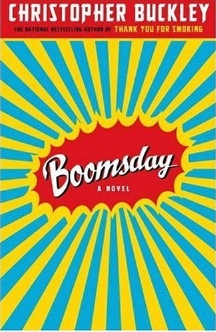 |
|
| The
cover costs more to print than the pages in this case. |
Buckley, meanwhile offers
us a sort of inverse vision. A young blogger who calls herself Cassandra
("she was pretty, she was blonde, she
had something to say" -- oooh scary!) offers up the Ultimate Tax
Break, this Soylent Green solution to the Social Security crisis. Well,
sans the
cannibalism,
sorry to say. If I'm
old, and you want me to off myself so YOU can live better, you can bet
my response is going to be, "Eat me!"
Unless of course, you're inclined to do just that.
Sawyer plays the situation for tears and fears, while Buckley goes for
the gut-laugh, but they both look long and hard at the generation gap.
Damn,
anyone here old enough to remember the generation gap? If so, don’t
raise your hands, you'll turn yourself into a target. But once again, recognize
(more easily in Buckley's case) that all this so-called science fiction speculation
is NOT about figuring out what’s going to happen in the future, but
rather figuring out what's happening in the present. Our nation and the Western
World ("I can feel the fear in the world," sang proto-new wave
rockers ULTRAVOX) are taking a look at themselves and not liking what they
see. Us old fogies only hoped to retire, you know, get up and read the paper,
putter around, watch some daytime TV. Instead we find that should we choose
such a lifestyle, we'll be eating dogfood for dinner, well, once they’ve
got the poison out and all.
Meanwhile, the restless youth around us just
wants to have fun, not work like dogs in the dirt so that we can do something
that we consider fun, which the young would consider living death. They'll
be doing us a favor to save us from dogfood and Oprah, right? Either way,
we're going to live in a world that features lots of great-looking young
folk, or young-looking rich folk. I say bring on the aliens and let 'em roast
everybody. If Soylent Green is good enough for people, then it's good enough
for little green men. Little green men, who have, by the by, figured out
a means creating a society that is equitable not just to the rich and poor,
but to the young and old as well. Interestingly enough, the old tend to be
rich and the young tend to be poor. Maybe there's a good reason for that
dichotomy.
|
| |
|
04-05-07: John Shirley Dwells In 'Living Shadows'
|
Stories: New and Preowned
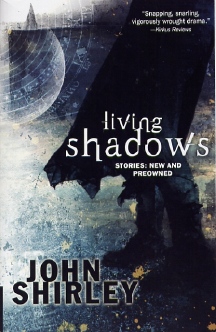 |
|
| You
don't need to sleep anymore. |
One of the most memorable
reading experiences I have ever had was the Scream / Press edition of John
Shirley's 'Heatseeker'. Between the stark illustrations
and the dark words lie worlds of such consuming power that they seem
to vacuum your consciousness into an annihilating void. In those moments,
reading works like "The Gunshot," I was swept into shadows
so dark they seemed to consume my perspective. Each tale was the prose
equivalent of a drug overdose, overwhelming to the brink of death.
Not necessarily a pleasant reading experience.
But a necessary one.
Shirley has since published many a collection, and they've all been powerful
reminders of how enjoyable it can be to find a writer who can link language,
image and emotion so simply. So 'Living Shadows: Stories New and Preowned'
(Prime books ; May 2007 ; $14.95) goes to the top of the purchase list
with a weird combination of distaste and anticipation. Shirley is one of
our most daring writers, the sort of fellow who knows precisely what most
readers' limits are and then steps easily past them, taking readers to
places they might not otherwise ever go. Genuine surprise is hard to find,
and John Shirley will genuinely surprise as he slips past your comfort
level. It's the sort of writing that makes reading truly pleasurable.
'Living Shadows' is split into two parts with an author's forward that
is short and to the point. The first half of the book is comprised of stories
without any notions of the fantastic; in the second half of the book, reality
gives way to something equally interesting, in Shirley's hands, but considerably
more plastic. Yes, reality does bend a bit in the final two stories
in the first part of the book, but no more than we usually see on network
TV in shows that are described with the word "reality". It is,
after all, in the eye of the beholder. Utility is as well. All of the stories
here may be found elsewhere, and there is a certain type of reader who
may actually have all the publications and anthologies in which they first
appeared. Interestingly enough, that sort of reader is most likely to want
this book, simply because of the utility of finding a variety of disparate
Shirley stories neatly put together at a bargain price. But one hope that
the same folks who buy T. C. Boyle's short story collections give this
one a try as well. You'll find many of the same features; dark humor, bright
prose, and smart, smart writing. I can honestly say that stories collected
here have changed the way I look at the world forever.
The first example would be from the first section of mostly realistic stories,
a section titled "A Few Blocks Down, Around the Corner". "Jody
and Annie On TV" is about a couple of ne'er-do-wells cruising the
freeways of Southern California who unintentionally cause a huge chain
reaction accident that results in fatalities. Shirley's descriptions of
the Hollywood Freeway near where it merges with the 405 infected my mind,
to the point where whenever I drive down in Southern California I think
of that story and see things in the smog-drenched slow motion described
by Shirley. The tug of that story is impacable. It's an immensely powerful
piece of writing. And no, I've never caused an accident I was not involved
in. It's been a while since I've had any automotive confrontations. I'm
a better person now. Really.
"The Gunshot", in the first part
of the book, hails from 'HeatSeeker' and is a potent look at media power
before media power was quite so apparent. The power of violence in the
media in particular, and its not the sort of gung-ho kill-'em-all power
you might expect. "What Would You Do For Love?" answers that
question in a manner that is certain to make the reader most uncomfortable.
The second part of the collection is titled "Through a Laser-Scanner
Darkly", and begins with Shirley's collaboration with Edgar Allen
Poe. That's right, the Poe, and the collaboration spins from an unfinished
fragment left by Poe that was the theme for an anthology from Cemetery
Dance titled 'Poe's Lighthouse' and edited by Christopher Conlon. "Sleepwalkers",
also from 'Heatseeker' is one of those dazing stories that will creep you
out for, like, ever. Lots of Shirley's stories circle around the horrors
of drug use, and they’re written in a languid, sensual prose that
is hypnotic and disturbing. When you realize what Hector is working up
to in "Skeeter Junkie", it's too late to pull out of the story.
And it’s too late to ever leave the images behind. Shirley is a master
at infusing dark visions of the future with horrific imagery. His work
is a particularly powerful distillation of science fiction horror. 'Living
Shadows' will indeed cast a specter over your reading, over your life.
Read it, or don’t at your own risk.
|
| |
|
04-04-07: Here, There and Anywhere ; Software Surges
|
Allen Steele, Tobias S. Bucknell and Kristin Landon Observe
Today in Tomorrow
|
|
Another
nice John Harris cover.
|
While the publishing world may on occasion assert that the biz
is going down the toilet, it's the sort of Big Swirly that
provides for the release
of lots of books. Whatever the economics of the situation, the result
for readers can be a glut of books Worth Your Valuable Time,
depending on your
reading inclinations. For example, those seeking some level-headed
science fiction series entries might be well-advised to pick
up the latest novel
by Allen Steele, 'Spindrift' (Ace / Penguin Putnam
; April 3, 2007 ; $24.95), a fascinating addendum to the 'Coyote' trilogy.
For those who missed 'Coyote',
'Coyote Rising' and 'Coyote Frontier', 'Spindrift' might make a great
introduction to Steele's universe. It's not exactly a prequel,
it’s more of an
inter-quel. Sometime after 'Coyote Rising', Europe launches the Galileo,
sending to check out a big old object code-named Spindrift that is cruising
just outside the Solar System. Wouldn’t you know it, Galileo disappears, but some sixty years later the shuttle, unfortunately for
the crew named
Maria Celeste, returns with but three left to tell the tale. Humanity
appears to have thrust its collective hand into the ol' cosmic meat
grinder. Quickly-turned
pages of hard-science space opera with aliens ensue. A must-read for Coyote fans, and the sort of book that will make others run out to
become Coyote fans, 'Spindrift' is a perfect example of a mature writer crafting
solid work that can hook one generation while satisfying another.
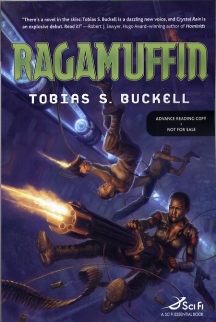 |
|
| Girls
with big guns. |
Or you can go the
new way and pick up the second novel by Tobias
S. Bucknell, 'Ragamuffin' (Tom Doherty Associates / Tor ;
June 2007 ; $24.95) set in
the same exotically flavored universe as 'Crystal Rain'. 'Ragamuffin'
pulls back the camera and gives us the big picture, moving from the
planetary
romance of 'Crystal Rain' to a tale much closer to traditional space
opera. From the get-go we learn that some aliens calling themselves
'The Benevolent
Satrapy' have kept a tight grip on 48 worlds and the wormhole tech
folks use to get round them. Humans don’t rate in this rule. We stink.
We're tolerated, and as a result, not happy campers. Nashara is a combat
veteran hired by The League of Human Affairs (oh, why not just call it
The Human League!) to kill an alien. For her trouble she gets sent to New
Aneganda, the setting of 'Crystal Rain'. There, she'll stir the pot until
it boils over. Problems ensue for both humans and the Satraps who think
humans are easily exterminated. Now don’t worry; Bucknell brings
back the Mongoose men. But he also gives readers a much bigger picture
as well as a gripping story. Like 'Spindrift', we've got ample evidence
here that science fiction is alive, well and kicking ass.
Taking a fork in the road is the conceptually fascinating novel by Kristin
Landon, 'The Hidden Worlds' (Ace / Penguin Putnam ; June 26, 2007 ; $7.99).
Here we have a real example of the amazing flexibility found within the
science fiction genre, and a true original. 'The Hidden Worlds' is the
first example of a Singularity-themed science fiction ... romance.
|
|
From
Land's End to stars' end.
|
Among other things.
The novel's premise finds the Earth destroyed by the Cold Minds and humanity
saved by jump-ship pilots who helped humans escape
to a variety of distant worlds. The Hidden worlds, doncha know it?
So here we are, some six hundred years on, and Linnea Kiaho, daughter
of the dirt-poorest
o the poorest of planets, decides to indenture herself to one of the
godless Pilot Masters. She's got a secret and when the time is right,
she plans
to sell. Of course everything goes in the shitter when her unwilling
master decides to spite his old man and thusly throws a monkey wrench
into the
whole pilot deal. Because, doncha know it, those nasty old Cold Minds
have managed to figger out where the Hidden Worlds are. Thus un-hiding
them
and making things a trifle difficult for the nearly feudal bureaucracy
that currently is tasked with saving Life As We Know It. Nasty, brutal
and short, to be sure, but life at least in some for that does not
involve slavery to machine intelligences.
The overlay of a Singularity scenario on sexy space opera is just really
wild; or rather, perhaps the endpoint of fictional evolution. The Singularity
is ready to spawn. Whatever the case, the book itself is a cut above, offering
some hardish science fiction and softish romance; blunt the impact of both,
split the difference and you have a novel more readable than a purebred.
And pretty damn exciting on a spaceship zooming about level.
For all that each of these novels offers us a vision of the future, it's
their collective visions of the present that are most fascinating. Each
of these writers offers us a vision of humanity humbled, put in its place
by the big ol' universe. We're at the center of our own stories, to be
sure, but we're not the most important thing out there. We are small players
on a big stage, and there are a lot of others out there who matter just
as much as we do if not more. Others who have power and are not afraid
to use it. The import of this message to the primarily American / Western
audience for science fiction should not be lost in all the enjoyment one
derives from reading space adventure stories.
We enjoy reading space adventures in part because they bring to mind the
world around us in a manner that is exciting and enjoyable yet quite pointedly
pertinent. These books aren't bitter pills, they aren't strident message
tracts, but they aren't just escapist entertainment. They are born in our
world, and of our world, even if the writers find it enjoyable and necessary
to invent new worlds. These books are not just telescopes into the possible
future. Rather, they view the present via the future. The telescope is
not a straight tube, but a U-shaped periscope, or really a kaleidoscope.
The present, these books tell us, is a mashup of peoples so different from
one another in terms of beliefs, customs and religions that they might
as well live on different planet. Explore the universe? We've got one close
to hand that clearly bears further examination.
|
A Review of 'Dreaming in Code' by Scott Rosenberg
I remember Chandler. Yes the author, of course, but also the software.
I remember when Chandler was going to change the world. Like the rest
of the world, I'm still waiting.
|
|
| Click
picture to launch big ol' piccie of what Chandler looks like. |
Not
that I haven’t downloaded the latest alpha release, and
started to play. My first impression was, "Well this is both confusing and
not all that useful." But the more I play, the more I find. It hasn’t
changed my world yet. But I can see the potential.
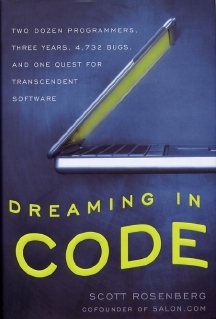 |
|
| Guys
with big ideas. |
Scott Rosenberg clearly
saw the potential way back in the before-time. Rosenberg, a co-founder
of Salon.com, was well
set to get his foot in the
door in order to become a fly on the wall when Mitch Kapor embarked
on the Ahabesque quest to crate the perfect Outlook killer. Now that's
a quest
I can hang with. When I was a director of IT, I came to hate Outlook
and the Exchange server that it required to support it. How could America's
biggest software company, how could even Micro$oft, screw up something
so
much? Sure the race to the bottom for the biggest buck had something
to do with it. So what would happen when brilliant, well-intentioned
people
decided to create some competition?
'Dreaming in Code' explains
exactly what happens. It does so with humor, wit and a pulse-pounding
pace, the diametric opposite of the pace
of software development. Here’s
my review of the book. Rosenberg
manages to evoke what we've learned about software development and
use the Chandler project
to illustrate. He tells a fascinating tale of technology, art and business
on a collision course. If you read or write science fiction, this is
essential, must-buy reading material. It's also must-buy, must-read
if you use computers,
or even just plan on living in the modern world. If you've got an electrical
outlet, this book should be next to it. You may never use Chandler,
or you may find you use it every day. But you'll never forget the lessons
you learn when you start 'Dreaming in Code'.
|
| |
|
04-03-07: Enrique de Hériz Tells 'Lies'
|
Tell me A Story
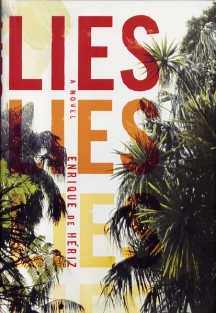 |
|
| ..and
damn lies and, well, you know. |
Without lies there would be no life. Every story we tell is a lie
and every word we speak but an approximation of the truth. Language is the
shield
with which we protect ourselves from the world around us, words mere
intermediaries between our vision of the world and the actuality of what
lies beyond our fingertips.
Sure, down those paths madness lies. Once you get stuck in that thought-train,
you'll never escape and you're well advised to avoid such ponderings lest
they leave you in limbo. Limbo is, however, an achievable state. It's not
just a metaphor. It is a way of being in this world that we can concretely
achieve if we're lucky enough to fall between the cracks, if the stories
people tell about us fall just so between what is and what is described.
Yes, 'tis but a short trip to the madhouse. But if you can stay away, you
can achieve a rare perspective. A parallax view that enables a glimpse
of, if not the truth, than a more interesting set of lies.
Enrique de Hériz is well accustomed to being in an in-between state.
He's the gentleman who translates much of the best literature written in
English into Spanish, in addition to being a writer of note in Spain. He's
translated Stephen King, Annie Proulx and Christopher Paolini. He's told
a few stories in his life and peered between the layers of language to
tell a few lies. His new novel is, in fact all 'Lies' ( Nan A. TALESE /
Doubleday / Random Hosue ; April 17, 2007 ; $26). It’s the story
of the stories we tell ourselves, our invention of our lives, the ways
we edit and what we elide. No less than a tale of how we create ourselves.
Isabel García Luna studies death. So when she turns up dead
herself following a boating accident deep in the Guatemalan jungle,
she knows the
drill. Her heart is still beating and she's breathing, but a badly
mangled body has been identified as her own, and she finds herself
beyond life
and death, though not beyond good and evil. Death proves to be a rather
appropriate state for Luna and she's not sure she wishes to return.
Isabel's daughter, Serena, thousands of miles away in Barcelona is
trying to make
sense of her mother's life and death, as she cares for her father who
is dwindling away with Alzheimer's. Both women delve into the lies
and facts
behind the family's history, and farther as well. 'Lies' moves beyond
the family, deep into history and legends, from the story of Isabel's
shipwrecked
grandfather to the battle of Formigues to the life of Chineses poet
Li-Po.
What 'Lies' does extremely well is to cast a spell over the reader
with stories, stories within stories and stories that lead to lies
or perhaps
the truth or perhaps events that are neither. De Hériz is an accomplished
storyteller and he gets in grace notes with death rituals ranging from
cannibalism to funerals. It's the kind of compelling literary fiction that
you can get lost in and don’t want to leave. And when you do leave
the book, you carry with you the lies it has told you, the lies that are
the lives within and the lies that become your life. "Tell me a story," Iggy
Pop once sang. "And maybe I'll believe in it."
|
| |
|
04-02-07: A 2007 Interview with Jon Clinch
|
"It's Like
Building a House Out of Raisins"
|
|
Lives
in a nice ranchish-type place.
|
'Finn' is Jon Clinch's first novel, but he interviews like a seasoned
pro. Of course, 'Finn' itself seems like the work of a seasoned pro,
so perhaps it's not too surprising that the author came off so well.
But really, I just had a hell of a good time talking with Clinch about
how he got to the point where he was able to not only write 'Finn' but
get it read by somebody who liked it enough to get it sold to a publisher.
I still think back about 'Finn' a lot, even though I finished it some
time ago. It's like a dark, filthy river of mud that you can't wash off
of your consciousness. But you don’t want to either because Clinch
gets just that single nubbin of humanity at the core of a monster; or
if you look at it inversely, he nails that thick slab of horrific monster
that slathers about over the tiny shreds of humanity within. Either way
you look at it, 'Finn' is one dark book. While I think it entirely unlikely,
it is without doubt one of the best horror novels I've read in quite
some time, and it would be nice to see it get some sort of best first
novel award recognition from the genre.
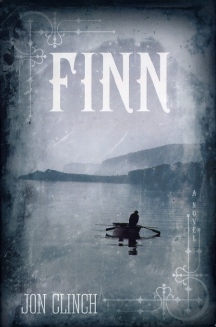 |
|
| One
dark river. |
Clinch spoke
engagingly of the FIVE, yes FIVE novels he wrote and chucked before stumbling
into the mind of Finn. This interview was the sort of
conversation that I think all beginning writers need to hear, because
Clinch really communicates the sort of drive you need to succeed and
how that drive comes from within, regardless to what's happening without.
He also talks about some pretty interesting sounding Internet communities
that helped aid him on his quest. We also talked about the moonshine
that permeates the novel, coincidentally
in the news of late.
Not surprisingly, readers and listeners will find the usual MP3 and RealAudio versions of the interview. More surprisingly, readers will find that
Clinch, a very literary author, cut his teeth reading science fiction,
in particular, Ray Bradbury. And that's not a bad yardstick to measure
both Clinch and 'Finn' by. 'Finn' is an elegantly written novel, but
has quite a bit more Clive Barker in it than Ray Bradbury, to my mind.
This is flesh-eating elegance, and I don’t recall Bradbury ever
going to such territory, nor deciding to dwell there for some three-hundred
something pages. Regardless of your reading interests, Clinch is simply
an interesting guy who deserves your time and attention. I am thinking
however, that one is well advised not to build any housing from dried
fruit products. Novels maybe; shelter still works best when constructed
from wood slats. Nailed shut.
|
| |
|
|






